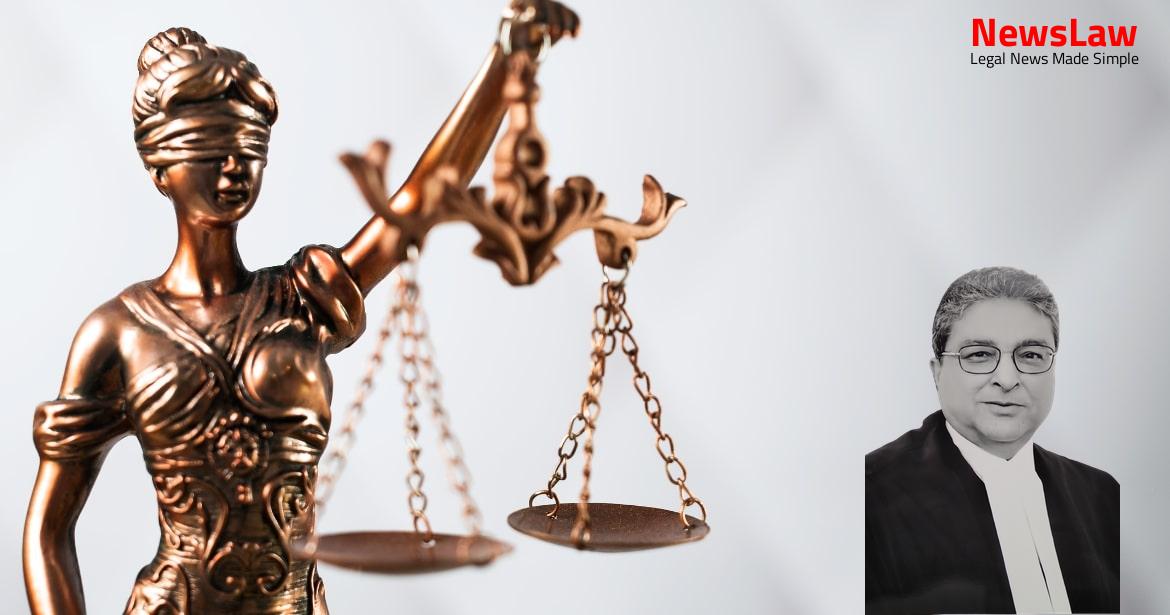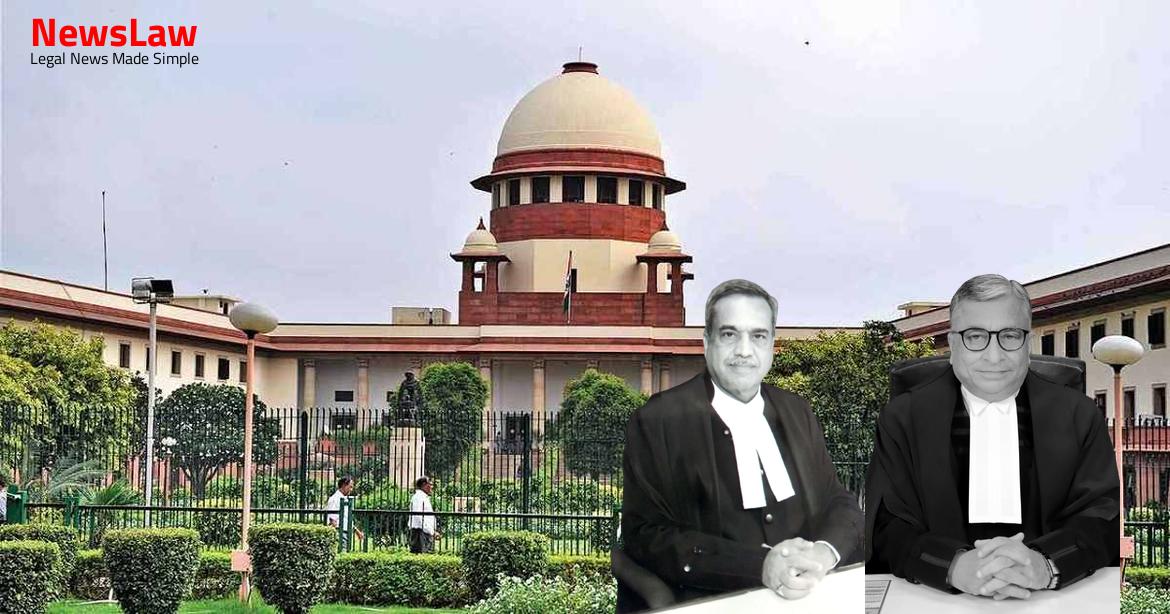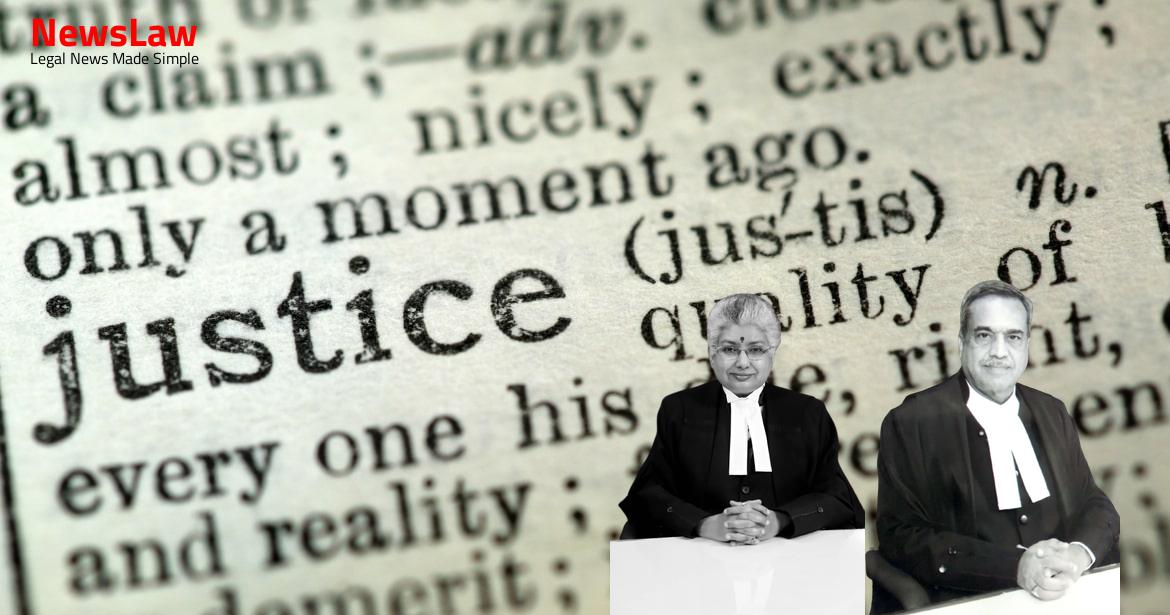Explore the intricate legal analysis surrounding delay and conduct in a specific performance case. The court’s scrutiny of the parties’ actions and inactions provides valuable insight into the requirements for seeking relief in contractual disputes. Follow along for a breakdown of the court’s judgments and the implications for similar cases in the future.
Facts
- The Writ Petition challenging the order of the Income Tax authority was allowed by the Madras High Court on 21.12.1992.
- The MOU dated 22.01.1994 was submitted by the Respondents, indicating a substitution for the agreements dated 20.03.1991.
- Appellants were deemed not ready and willing to perform their part of the agreement based on factors like lack of notice for execution of sale deeds and failure to purchase stamp papers.
- MOUs dated 24.01.1994 were considered additional to the agreements dated 20.03.1991.
- Indian Bank initiated a suit for recovery of its dues from the Respondents.
- Income Tax authorities passed an order for compulsory acquisition of the property on 25.06.1991, leading to separate agreements between the parties on 20.03.1991.
- The Division Bench of the High Court reversed the decree for specific performance passed by the Single Judge in favor of the Appellants.
- Original suit appeals filed by the Respondents were allowed by a Division Bench of the High Court on 25.07.2008.
- The judgment of the Division Bench reversing the decrees in favor of the Appellants is being appealed against in the present case.
- All four suits were tried together, and the Single Judge of the High Court decreed the suits on 17.07.2003.
- The High Court refused to grant relief of specific performance to the Appellants due to their inaction for over two years after entering into the MOU.
- The Division Bench of the High Court criticized the conduct of the Appellants as a reason for denying them the relief of specific performance.
- The learned Single Judge of the High Court stated that the Appellants showed interest in performing their part of the agreement and had sufficient funds.
- The High Court emphasized the conduct of the Appellants in its decision to deny them relief.
- The Division Bench held that the Appellants did not promptly deposit the balance sale consideration after the disposal of the Writ Petition.
- The Division Bench found the Appellants guilty of total inaction and emphasized the importance of timely payment of the balance consideration.
Also Read: Legal Analysis on Seniority Fixation in Contempt Petitions
Arguments
- The Appellants argued that the interpretation of the MOU is contrary to established law.
- The sale consideration for the property was mostly paid by the Appellants by August 1994.
- The Appellants were faulted by the High Court for not paying the balance consideration immediately after the disposal of the Writ Petition.
- Mr. Srivatsa, representing the Appellants, emphasized the need to interpret the agreement as a whole along with surrounding circumstances.
- The relevant clause in the agreement required the balance consideration to be paid at the time of registration of sale deeds, not immediately after the disposal of the Writ Petition.
- The pendency of the Writ Appeal by the Income Tax Department caused the Appellants to delay filing suits after the disposal of the Writ Petitions.
- The Appellants argued that there was no delay in filing the suits, referencing relevant judgments.
- The Division Bench found fault with the Appellants for not proving how they obtained possession of part of the property.
- The claim for vacant possession was dismissed as the Appellants were still in possession of part of the property.
- The Appellants’ attempt to trespass into the property disentitled them from seeking specific performance.
- Respondents argued that the escalation in property prices in Chennai is relevant.
- Appellants did not pay the balance sale consideration, violating their obligation.
- Delay of two years and three months post disposal of the Writ Petition is considered fatal for relief.
- Time was highlighted as essential in the agreements by the Respondents.
- Appellants filed the suit only between October and December, 2000 after the Writ Petitions were disposed of in 1998.
- Mr. Narasimha supported the Division Bench’s judgment, emphasizing that possession was not granted to the Appellants at the time of agreement.
- No provision in the MOU stated about possession being handed over to the Appellants.
- Appellants did not clarify how they acquired possession of the first floor.
- No notices were sent by Appellants to execute sale deeds post disposal of the Writ Petitions.
- Appellants allegedly tried to interfere with Indian Bank’s possession of a portion of the building.
Also Read: Interpretation of Section 80-IA Deductions
Analysis
- The First Appellate Court, being the last Court on findings of fact, should refrain from interfering with the judgment of the Division Bench of the High Court.
- In a suit for specific performance, any delays due to the Court process should not be used against the plaintiff in decreeing specific performance.
- Payment of balance consideration was required only at the time of registration of sale deeds as per the MOU.
- Failure to take steps to demolish the structure highlighted the inaction of the Respondents.
- Appellants were criticized for not proving how they were put in possession of the property and for attempting to take forcible possession.
- A delay in filing civil suits post the Writ Petition disposal was justified due to pending Writ Appeals.
- The finding that Appellants were not ready and willing to perform their part of the contract by not paying immediately after Writ Petition disposal was deemed erroneous.
- Appellants cannot be denied relief on the grounds of delay in payment or trespass attempts.
- The discretion of the Court to order additional payments by the plaintiff after decreeing specific performance is acknowledged.
- Details of how possession was given to the Appellants not being pleaded was not a ground to deny relief.
- The judgment of the Division Bench of the High Court is set aside and the judgment and decree passed by the learned Single Judge is restored.
- The Appeals are allowed accordingly.
- Escalation of prices cannot be the sole ground to deny specific performance.
- The Respondents are not entitled to any additional amount as 90 per cent of the sale consideration was paid by the Appellants before 1994.
Also Read: Judicial Analysis on Selection Process
Case Title: A.R.MADANA GOPAL ETC.ETC. Vs. M/S RAMNATH PUBLICATIONS P.LTD.. AND ANR. ETC. ETC. (2021 INSC 243)
Case Number: C.A. No.-003523-003526 / 2010



